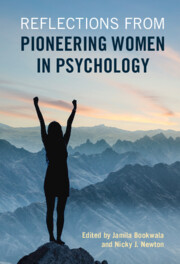Book contents
- Reflections from Pioneering Women in Psychology
- Reflections from Pioneering Women in Psychology
- Copyright page
- Contents
- Contributors
- Foreword
- Acknowledgments
- Introduction
- Chapter 1 Hardly a Straight Line
- Chapter 2 Challenging Paradigms
- Chapter 3 From Young and Naïve to Old and Experienced
- Chapter 4 Being the Change You Want to See in the World
- Chapter 5 Accidental Professor
- Chapter 6 Finding a Place and Changing the Space
- Chapter 7 The More You Do, the Better It Gets
- Chapter 8 Happily Ever After
- Chapter 9 Love and Work
- Chapter 10 Overcoming Obstacles and Thriving
- Chapter 11 Out of the Box
- Chapter 12 Stress Has Been Good to Me
- Chapter 13 On Pioneering at Northwestern University… With a “Village” of Supports
- Chapter 14 Against All Odds
- Chapter 15 Tricked by Memory
- Chapter 16 Doing Psychology in Unsettled Times
- Chapter 17 Overcoming Obstacles
- Chapter 18 Knocking on Doors that Opened for Me
- Chapter 19 Paths Unexpected, but Rewarding, during an Academic Journey
- Chapter 20 Reflections on an Improbable Journey
- Chapter 21 The Delicate Art of Balancing Serendipity and Planfulness in an Academic Career
- Chapter 22 A “Skin in the Game” Scaffolded Career Path
- Chapter 23 A Wonderful Journey Along an Unforeseen Path
- Chapter 24 Choosing Both
- Chapter 25 Identity and My Life Story in Psychology
- Chapter 26 Doing What Matters: A Framework for Academic Success
- Conclusion
- Index
- References
Chapter 14 - Against All Odds
An American Indian Creates a Path
Published online by Cambridge University Press: 09 April 2022
- Reflections from Pioneering Women in Psychology
- Reflections from Pioneering Women in Psychology
- Copyright page
- Contents
- Contributors
- Foreword
- Acknowledgments
- Introduction
- Chapter 1 Hardly a Straight Line
- Chapter 2 Challenging Paradigms
- Chapter 3 From Young and Naïve to Old and Experienced
- Chapter 4 Being the Change You Want to See in the World
- Chapter 5 Accidental Professor
- Chapter 6 Finding a Place and Changing the Space
- Chapter 7 The More You Do, the Better It Gets
- Chapter 8 Happily Ever After
- Chapter 9 Love and Work
- Chapter 10 Overcoming Obstacles and Thriving
- Chapter 11 Out of the Box
- Chapter 12 Stress Has Been Good to Me
- Chapter 13 On Pioneering at Northwestern University… With a “Village” of Supports
- Chapter 14 Against All Odds
- Chapter 15 Tricked by Memory
- Chapter 16 Doing Psychology in Unsettled Times
- Chapter 17 Overcoming Obstacles
- Chapter 18 Knocking on Doors that Opened for Me
- Chapter 19 Paths Unexpected, but Rewarding, during an Academic Journey
- Chapter 20 Reflections on an Improbable Journey
- Chapter 21 The Delicate Art of Balancing Serendipity and Planfulness in an Academic Career
- Chapter 22 A “Skin in the Game” Scaffolded Career Path
- Chapter 23 A Wonderful Journey Along an Unforeseen Path
- Chapter 24 Choosing Both
- Chapter 25 Identity and My Life Story in Psychology
- Chapter 26 Doing What Matters: A Framework for Academic Success
- Conclusion
- Index
- References
Summary
I was born on a California reservation in 1936. Frightened by the violence and poverty, I escaped to college, the first California reservation Indian ever to attend college. Life was pleasant, and education provided a secure home. Reminded by classmates that Indians didn’t go to college and that I would “flunk out,” I was the only student who obtained all As. I obtained a PhD and was hired by the psychology department at San Diego State (SDSU). For someone who had basically never talked to anyone, this provided a steep learning curve. A full professor at age 36, I moved from SDSU to the University of Utah, where I married Robert Barnhill and acquired two great stepchildren. Together we moved to Arizona State, where I worked with American Indian groups. Moving to the University of Kansas (KU), I wrote endless grants, garnering more than $35million for my projects. I worked closely with Haskell Indian Nations University and created collaborations that still exist. I was recognized in the White House with a Presidential Award for Excellence in Science, Mathematics, and Engineering Mentoring from President Obama for this work. I continued to work at Haskell and KU into my 80s. With a balance between profession and family, I count it a good life.
- Type
- Chapter
- Information
- Reflections from Pioneering Women in Psychology , pp. 178 - 189Publisher: Cambridge University PressPrint publication year: 2022

